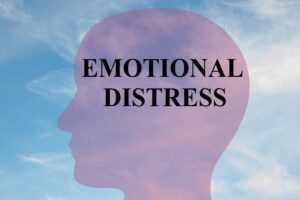When you think of personal injury, physical injuries like broken bones or concussions might come to mind. However, personal injury goes beyond just physical harm. Serious accidents and injuries can also result in severe mental and emotional injuries, which often require treatment and disrupt a victim’s life. As a result, emotional distress can also be a significant part of a personal injury claim. Even though emotional consequences are less visible than physical injuries, they are still a compensable loss in many cases.
If you or a loved one has suffered emotional distress as a result of someone else’s negligence, you should understand your rights and options. An experienced personal injury lawyer can provide legal guidance and support throughout your case. Contact one today to schedule a free consultation.
Common Challenges of Personal Injury Cases
 Personal injury cases involve situations where an individual is harmed due to another party’s negligent or intentional actions. These cases typically focus on physical injuries such as broken bones, or whiplash. However, the consequences of an accident can extend far beyond the physical realm.
Personal injury cases involve situations where an individual is harmed due to another party’s negligent or intentional actions. These cases typically focus on physical injuries such as broken bones, or whiplash. However, the consequences of an accident can extend far beyond the physical realm.
In legal terms, personal injury is a broad category that encompasses various types of accidents and incidents, such as car accidents, slips and falls, and product liability. Personal injury law allows victims to seek compensation for their injuries and losses, including medical expenses, lost income, and pain and suffering.
Types of Personal Injury Claims
When it comes to personal injury cases, there are various types of claims that individuals can pursue. This section will explore some common types of personal injury claims and provide insights into how an attorney can assist you in each situation.
Slip and Fall Accidents
Slip and fall accidents can happen anywhere, from a grocery store to a neighbor’s house. These accidents occur when someone slips or trips and becomes injured as a result. Common causes of slip and fall accidents include wet or slippery floors, uneven or broken pavement, inadequate lighting, and walkway obstacles.
If you have suffered an injury in a slip and fall accident, you need evidence to prove your claim, such as photographs, witness statements, and incident reports. An experienced personal injury attorney can help you determine if you have a valid claim and guide you through the legal process, advocating for your rights and ensuring you receive the compensation you deserve.
Car Accidents
Car accidents are a leading cause of personal injury claims. Whether you were the driver, a passenger, or a pedestrian, you may be entitled to compensation if you have suffered an injury in a car accident due to someone else’s negligence. Common causes of car accidents include distracted driving, speeding, drunk driving, and reckless behavior.
In a car accident claim, an attorney can gather evidence such as police reports, medical records, and witness statements to build a strong compensation case. They can negotiate with insurance companies on your behalf and, if necessary, take your case to trial to ensure you receive the maximum compensation possible.
Product Liability
Product liability claims arise when a defective or dangerous product causes injury. Whether it is a faulty car part, a defective toy, or a harmful medication, manufacturers and distributors can be held responsible for the injuries caused by their products. Product liability cases often involve complex investigations and require expert testimony.
An attorney experienced in product liability claims can assist you in gathering evidence, identifying responsible parties, and building a strong compensation case. They will fight for your rights and hold negligent manufacturers accountable for the harm their products have caused.
Personal injury cases cover a wide range of situations. Consulting a personal injury attorney is essential to help you navigate the legal process, protect your rights, and ensure you receive the compensation you deserve. Whether you have suffered an injury due to negligence or a defective product, an attorney can provide the knowledge, experience, and support needed to achieve a favorable outcome in your case.
The Impact of Emotional Distress
 Personal injury victims often suffer physical harm, but what about the emotional toll it takes? If you or a loved one have been through a traumatic event and are seeking justice, it helps to understand how emotional distress factors into your case.
Personal injury victims often suffer physical harm, but what about the emotional toll it takes? If you or a loved one have been through a traumatic event and are seeking justice, it helps to understand how emotional distress factors into your case.
Personal injury cases involve seeking compensation for the harm caused by someone else’s negligent actions. While physical injuries are often the primary focus, emotional distress can also be a significant factor. Emotional distress is a broad term used to describe the psychological impact that a traumatic event can have on an individual. It encompasses a wide range of emotions, including anxiety, depression, fear, post-traumatic stress disorder (PTSD), and other mental health issues. The emotional trauma experienced by personal injury victims can often be just as debilitating, if not more, than the physical injuries they sustain.
Understanding Emotional Distress in Personal Injury Cases
In a personal injury case, emotional distress can be a standalone claim or an element of damage that accompanies physical injuries. To successfully claim emotional distress, you or your personal injury attorney will need to demonstrate that:
- The defendant’s (the at-fault party, such as the driver who caused a car accident) conduct caused emotional distress.
- The emotional distress is severe and significant.
- The emotional distress is a direct result of the defendant’s negligent actions.
Recognizing Emotional Distress in Personal Injury Cases
In many jurisdictions, personal injury claims do include provisions for compensation relating to emotional distress. This recognizes the significant impact that trauma can have on a person’s mental well-being. Whether it is the anxiety caused by a car accident or the lasting emotional trauma from a workplace accident, the law acknowledges the full scope of damages that can result from a personal injury incident.
Proving Emotional Distress in Your Personal Injury Case
When pursuing a personal injury claim that includes compensation for emotional distress, you must showcase the impact it has had on your life. This can be done through various means, including:
- Medical Documentation: Seeking treatment from a mental health professional and obtaining medical documentation can provide objective evidence of your emotional distress. This includes therapy sessions, doctor’s notes, and diagnoses of conditions such as PTSD or depression.
- Witness Testimony: If friends, family members, or colleagues have observed the changes in your behavior or mental state since the incident, their testimonies can strengthen your case. Their observations can lend credibility to the extent of the emotional distress you have endured.
- Personal Journals: Keeping a journal detailing your emotional journey can be a powerful tool in demonstrating the impact of the traumatic event. These entries can offer a firsthand account of your experiences, emotions, and struggles, providing valuable insight into your mental state.
- Expert Witnesses: In some cases, expert witnesses such as psychologists or psychiatrists may be called upon to evaluate and testify on your behalf. Their professional opinions can lend additional weight to your claim of emotional distress.
Strategies for Pursuing Emotional Distress Claims
If you or a loved one is seeking to pursue an emotional distress claim in a personal injury case, there are several essential strategies to consider:
- Seek immediate medical attention: Seek medical attention promptly after the incident to address both physical injuries and potential emotional distress. This ensures your health and well-being and establishes a medical trail that can be used as evidence in your case.
- Document your emotions and experiences: Keep a journal where you can document your emotions, experiences, and any challenges you face as a result of the emotional distress. This can serve as a crucial resource when recounting your experiences during legal proceedings.
- Consult an experienced personal injury attorney: Working with an experienced personal injury attorney specializing in emotional distress cases can significantly improve your chances of success. They can guide you through the legal process, gather and preserve relevant evidence, negotiate with insurance companies, or represent you in court if necessary.
- Gather evidence: Collect any evidence that supports your emotional distress claim, such as medical records, therapist notes, photographs, and witness statements. This evidence will strengthen your case and increase your chances of receiving fair compensation.
- Consider the long-term impact: Emotional distress can have long-lasting effects on your life, and you must consider the potential future consequences when seeking compensation. Working with your attorney, assess the full extent of the emotional distress’s impact on your mental and emotional well-being and ensure that your claim accounts for these long-term effects.
- Be aware of the statute of limitations: Personal injury victims only have a limited amount of time to file a claim. This strict deadline can vary between jurisdictions and in various circumstances, such as claims involving minor children or government entities. Those suffering a personal injury should be aware of the deadlines in their case, and an experienced attorney can tell them these deadlines under their state’s statute of limitations.
Seeking Compensation for Emotional Distress
In personal injury cases involving emotional distress, victims may be entitled to various types of compensation. These can include:
- Economic damages: These are quantifiable expenses, such as medical bills, therapy costs, lost income, and property damage. These damages aim to compensate the victim for the financial losses incurred as a result of the emotional distress.
- Non-economic damages: These damages cover the intangible losses suffered by the victim, such as pain and suffering, loss of enjoyment of life, and emotional trauma. While these damages are more challenging to calculate, they aim to provide compensation for the emotional toll the personal injury incident has taken on the victim’s mental and emotional well-being.
Personal injury claimants should know that the availability and amount of compensation for emotional distress may vary depending on the jurisdiction and the case’s specific circumstances. Consulting a personal injury attorney is essential to understand your rights and pursue the compensation you deserve.
The Role of a Personal Injury Attorney
The legal challenges of a personal injury claim, including the inclusion of emotional distress, require the skills of a personal injury attorney. An attorney specializing in personal injury law will gather the necessary evidence, build a strong case, and negotiate for fair compensation on your behalf.
A skilled personal injury attorney can take on the following tasks:
- Case evaluation: A personal injury attorney will assess the strengths and weaknesses of your claim, including the emotional distress element. They will provide an honest assessment and advise you on the best course of action.
- Gathering evidence: An attorney will collect the necessary evidence, such as medical records, witness testimonies, and expert opinions, to support your emotional distress claim.
- Negotiations with insurance companies: Insurance companies may downplay the significance of emotional distress or refuse to compensate you adequately. An attorney will negotiate on your behalf to seek fair compensation for the emotional distress you have suffered.
- Trial representation: If your case goes to trial, a personal injury attorney will advocate for you in court, presenting a compelling argument for why you deserve compensation for your emotional distress.
Remember, the civil legal system can be complex, and personal injury cases involving emotional distress can be particularly challenging. If you or a loved one has experienced emotional distress as a result of a personal injury incident, consult an attorney who understands the nuances of these cases. By seeking legal representation, you can best protect your rights and future, as they will seek the full compensation you deserve. Reach out today to schedule a consultation with a personal injury attorney.




















